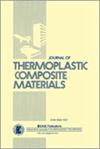碳纤维增强聚合物复合材料在严重热侵蚀下的原位层间剪切行为:PPS 与环氧树脂层压板的对比
IF 3.4
4区 材料科学
Q2 MATERIALS SCIENCE, COMPOSITES
引用次数: 0
摘要
本研究探讨了热通量和弯曲载荷对准各向同性碳纤维增强聚苯乙烯和环氧树脂层压板层间剪切行为的影响。无论热通量强度如何(20 至 50 kW/m2),C/环氧层压板的最大表面温度都高于热分解[计算公式:见正文]的起始温度([计算公式:见正文]),而 C/PPS 层压板只有在热通量为 40 至 50 kW/m2 时才会出现热分解([计算公式:见正文])。为研究聚合物层压板在热侵蚀(由锥形量热计施加)过程中的层间剪切行为,专门设计了一个机械工作台。与参考值(接收状态)相比,C/PPS 层压板的弯曲模量和表观 ILSS(50 kW/m2 以下)降低了约 80%。在碳纤维/环氧树脂层压板中,与参考值(接收状态或原始状态)相比,弯曲模量和表观 ILSS(低于 50 kW/m2)分别降低了约 20% 和 50%。在碳纤维增强聚合物材料中,基体状态对于保持纤维网的内聚力和层间的粘合力至关重要,而在高热通量条件下,一旦基体热解严重降低了材料的层间性能,C/环氧树脂和 C/PPS 层压板的这一作用似乎就会受到影响。本文章由计算机程序翻译,如有差异,请以英文原文为准。
In situ interlaminar shear behavior of carbon fibers reinforced polymer composites exposed to severe thermal aggressions: PPS versus epoxy laminates
This study investigates the influence of a combined thermal heat flux and a flexural loading on the interlaminar shear behavior of quasi-isotropic carbon fibers reinforced PPS and Epoxy laminates. Regardless the intensity of the heat flux (ranging from 20 to 50 kW/m2 ), the maximum surface temperature is higher than the onset of thermal decomposition [Formula: see text] in C/Epoxy laminates ([Formula: see text]) whereas the thermal decomposition is reached only for 40-50 kW/m2 heat fluxes in C/PPS laminates ([Formula: see text]). A mechanical bench was specifically designed to study the interlaminar shear behavior of polymer-based laminates during the thermal aggression (imposed by a cone calorimeter). In C/PPS laminates, with respect to the reference values (as received state), the flexural modulus and the apparent ILSS (under 50 kW/m2 ) decreases by about 80%. In C/Epoxy laminates, with respect to the reference values (as received or virgin state), the flexural modulus and the apparent ILSS (under 50 kW/m2 ) decreases by about 20% and 50%, respectively. In carbon fiber-reinforced polymer materials, the matrix state is crucial for preserving the cohesion of the fibers network and the bonding of the plies together, a role that seems compromised in C/Epoxy and C/PPS laminates under high heat flux conditions, once the pyrolysis of the matrix has severely degraded the interlaminar properties of the material.
求助全文
通过发布文献求助,成功后即可免费获取论文全文。
去求助
来源期刊

Journal of Thermoplastic Composite Materials
工程技术-材料科学:复合
CiteScore
8.00
自引率
18.20%
发文量
104
审稿时长
5.9 months
期刊介绍:
The Journal of Thermoplastic Composite Materials is a fully peer-reviewed international journal that publishes original research and review articles on polymers, nanocomposites, and particulate-, discontinuous-, and continuous-fiber-reinforced materials in the areas of processing, materials science, mechanics, durability, design, non destructive evaluation and manufacturing science. This journal is a member of the Committee on Publication Ethics (COPE).
 求助内容:
求助内容: 应助结果提醒方式:
应助结果提醒方式:


